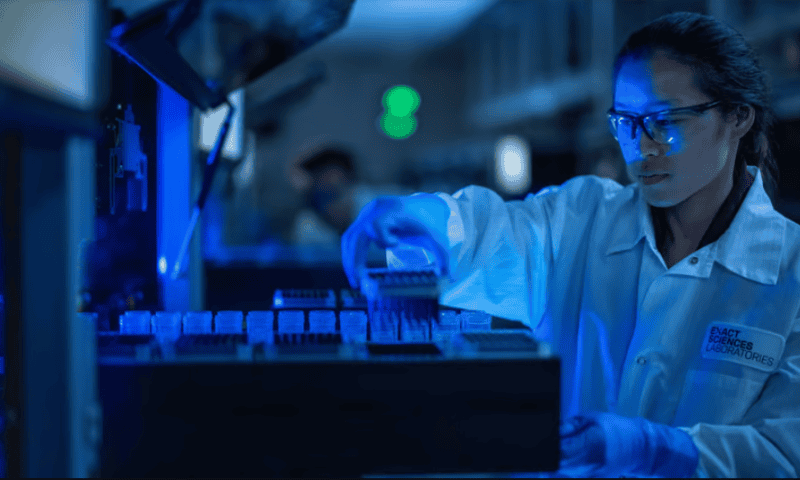Exact Sciences has put forward positive data on its approach to screening for esophageal tumors and the disease’s precancerous conditions with a method that may allow patients to skip a sedated endoscopic exam.
The company’s Oncoguard Esophagus test—being developed through a collaboration with the Mayo Clinic—begins with a swallowable capsule attached to, essentially, a string. Once it reaches the stomach, acid dissolves its coating to reveal an expanding sponge. After less than 10 minutes, it’s drawn back up the esophagus, collecting cell samples on the way out.
After that, Exact Sciences’ test searches for specific DNA biomarkers tied to esophageal adenocarcinoma and its precursor condition known as Barrett’s esophagus, which involves changes to the organ’s natural lining in the face of gastric reflux disease.
Patients with Barrett’s esophagus have a higher risk of progressing to deadly cancer if it is not caught early, with more than 80% of patients dying within five years of an adenocarcinoma diagnosis.
According to the company, the majority of cases of this type of cancer are currently discovered in the advanced stages, with earlier phases typically displaying no signs or symptoms. Exact Sciences and the Mayo Clinic estimate about 30 million people in the U.S. could carry a high risk for the disease.
“Standard methods of screening can be invasive and costly for patients, which is why there has been a recent push to change the screening guidelines to include non-endoscopic tests,” Prasad Iyer, M.D., a professor of medicine at the Mayo Clinic Comprehensive Cancer Center, said in a statement.
Their study, published this week in the journal Clinical Gastroenterology and Hepatology, included 352 participants in an algorithm training set and 125 in the testing set. The test’s model delivered 100% sensitivity, or zero false-negative results, across both arms when it came to detecting cases of esophageal adenocarcinoma or Barrett’s esophagus with high-grade dysplasia.
In earlier stages of Barrett’s esophagus, its panel of methylated DNA biomarkers posted 88% sensitivity and 84% specificity in the study’s testing arm.
“In esophageal cancer, earlier screening and detection will provide an important advance, as we have seen in other cancers,” said Paul Limburg, M.D., Exact Sciences’ chief medical officer for screening. “While many experts recommend that people with chronic reflux disease and at least one other risk factor be screened for Barrett’s esophagus, only a small number of eligible patients undergo screening currently.”
Exact Sciences is not the only company pursuing a pull-string approach. Last month, Cambridge, U.K.-based developer Cyted Health received a clearance from the FDA for its EndoSign cell collection system.
At the same time, Cancer Research UK and the country’s National Institute for Health and Care Research have plans to launch a clinical trial this year of 40,000 people taking long-term heartburn medications to try out Cyted’s device and the Cytosponge diagnostic test backed by NHS Scotland.
Meanwhile, in the U.S., a similar cell-sampling device has been developed by PAVmed and its Lucid Diagnostics subsidiary, dubbed EsoGuard.
Lucid reported its full-year earnings earlier this week, including $2.4 million in EsoGuard revenues—with $1 million of that coming in during 2023’s fourth quarter alone. The company’s CEO, Lishan Aklog, said that its clinical data also provide “what now we believe is line of sight to Medicare coverage” in the future for the screening test.

